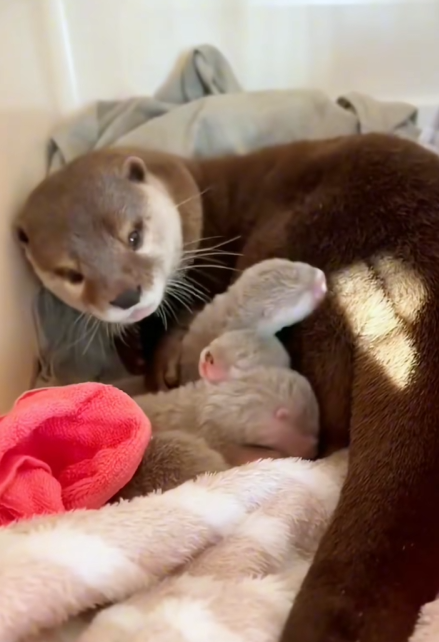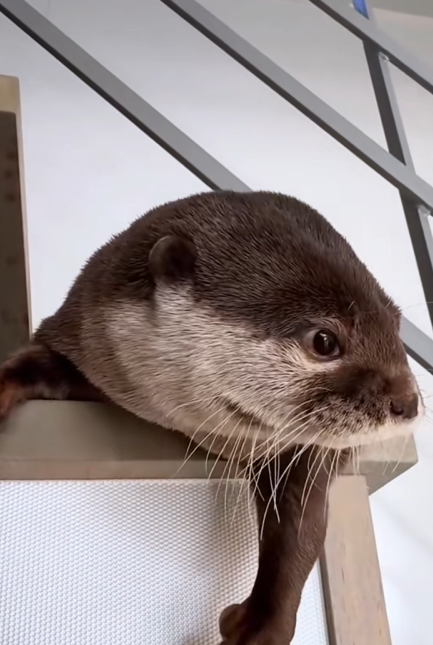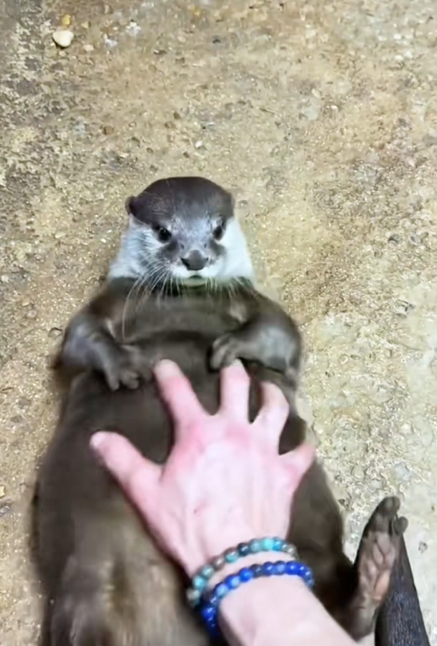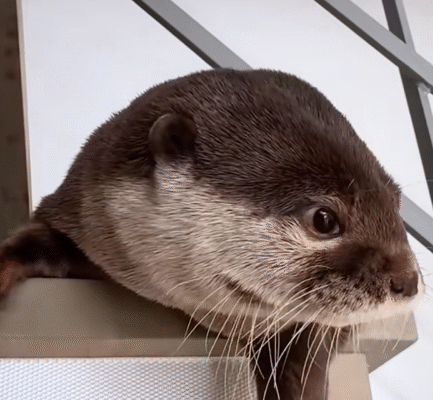
It started as an ordinary morning along the misty banks of the river that curled quietly behind our village. I was out for my usual walk, the sun barely warming the dew-kissed grass beneath my boots. Birds chirped overhead, and dragonflies danced over the calm water. The serenity of nature always gave me peace. But that day, something felt different. There was a tension in the air, something subtle but unmistakable.
As I rounded the bend near the old wooden bridge, I heard a faint splash followed by a series of distressed chirping sounds. I froze. The sounds were urgent—not the usual playfulness of animals but cries for help. I hurried toward the source, stepping carefully over the tangled roots and reeds that lined the bank. And there, half-submerged in the water, struggling frantically, was a small otter.
Its slick brown fur was soaked and matted. It twisted and turned desperately, caught in a piece of green nylon netting, likely discarded by a careless fisherman. The poor creature was tangled around its midsection and back legs. Every time it tried to swim away, the net cut deeper.
Without thinking, I waded into the shallow part of the river. The water was cold, and the mud squished between my toes. I spoke softly, trying to calm the otter, though I knew it didn’t understand my words. Still, my tone seemed to soothe it. The otter stopped thrashing just long enough for me to reach it.
I pulled out my pocketknife—something I always carried when walking near the woods—and began to carefully slice away at the knotted net. It took time. The net was tightly wound and embedded in some places. The otter whimpered and squirmed, but eventually, I freed it. Its small body shivered, more from exhaustion and fear than from cold. I scooped it up gently, wrapping it in my jacket.
I had no plan beyond that moment. But there was no way I could just leave it there. I carried it back to my cottage, about a 15-minute walk away. The entire way, the otter barely moved. It blinked at me occasionally, its dark eyes glossy with confusion and pain.
Once home, I dried it off, cleaned the minor wounds, and made a small bed with towels in a wooden box by the fireplace. I called the local wildlife rescue center, but they said it would be a few days before they could come due to flooding on the mountain roads. That meant I was now, unexpectedly, the caregiver of an injured otter.

Over the next few days, the otter—whom I named Ollie—began to recover. I researched what otters could eat and prepared a mix of fish, eggs, and soft vegetables. At first, he was cautious, refusing to eat unless I stepped out of the room. But slowly, trust began to grow between us. He’d eat while I sat a few feet away. He’d watch me with those expressive eyes, his little paws holding the fish with surprising dexterity.
By day four, Ollie was moving more confidently, even exploring the edge of the hearth and the rug. He seemed fascinated by the reflection in my glass cabinet. He’d stare at it, occasionally tapping the glass, then look back at me as if asking, “Who’s that?”
When the wildlife team finally arrived, I expected to feel nothing but relief. Instead, I was overwhelmed with sadness. I had grown attached to this little creature. He had shown me trust, made me laugh, and given me something to care for beyond myself.
The team was impressed by his condition. They said he’d make a full recovery and that they’d monitor him before releasing him back into the wild. As they placed him in a special crate, Ollie looked back at me once, his nose twitching, his eyes calm.
Weeks passed. I went back to my walks, now always carrying gloves and scissors in case I ever found another animal in need. The river looked the same, but I felt different. Rescuing Ollie had given me a new sense of connection to the world around me.

One morning, about a month later, I received a call from the wildlife center. Ollie was healthy and ready to be released. They invited me to be there.
I drove to the river with excitement and nervousness battling in my chest. The team met me at the same bend where I had first found him. The sky was clear, and the water sparkled in the sunlight. They opened the crate, and for a moment, Ollie hesitated. Then, he scampered out, paused to sniff the air, and slid into the water with grace.
He swam in a wide circle, then popped his head up and looked directly at me. For just a second, I could swear he smiled. Then he disappeared into the reeds, back into the wild where he belonged.
But that’s not where the story ends.
A few weeks later, as summer settled in, I was walking by the river again, this time with a thermos of tea and a small sketchpad. I liked to draw now—mostly animals, mostly Ollie. I heard a rustle near the bank and looked up to see an otter watching me.
It was him.
He was only there for a moment before darting off, but I knew it was Ollie. Something about the way he looked at me—it wasn’t fear or confusion, but recognition.
From then on, I’d occasionally see him during my walks. He never got too close, but he always let me know he was there—splashing just a bit louder, leaving fresh paw prints on a rock, or peeking from the water’s edge.
The encounter reminded me that sometimes the smallest acts of kindness—like cutting a net from a struggling otter—can ripple through your life in the most unexpected ways. Saving Ollie didn’t just help him. It helped me rediscover a sense of purpose, of care, and of belonging.
And now, every time I see those quiet ripples in the water, I smile, wondering if my little friend is saying hello again.



